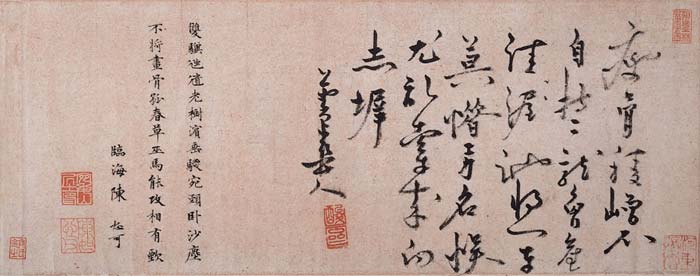
"Two Horses" inscribed by Zhao Mengfu, collected by the National Palace Museum, Taipei
Guanyunshi (1286-1324) was a Uyghur writer in the Yuan Dynasty. The grandson of Ali Haiya, a hero of the Yuan Dynasty. His original name was Xiaoyunshi Haiya. Because his father's name was Guanzhi brother, he took Guan as his surname. He called himself Suan Zhai and also called Luhua Taoist. At the beginning, due to his father's influence, he became Dalu Huachi, the Mansion of Ten Thousand Households in the Huaihe River and Huaihe River, and passed the title to his younger brother. He lived an elegant life of "wandering in the beautiful landscapes with the scribes", "promoting peace all day long, and forgetting it all". During the reign of Emperor Renzong, he studied as a bachelor in the Hanlin Academy, served as a doctor in the Imperial Academy, and studied national history with Zhi Zhi Gao. However, he soon resigned due to illness and hid in Hangzhou. It can be said that "Abandoning the name and going back, the heart is happy, and the white clouds are out of the sky with a smile. There are three or five close friends. What's the hindrance to drinking? The drunken robe sleeves dance and the world is narrow. - [Qingjiang Yin]"
Guanyunshi was deeply influenced by Han culture. He was talented and good at composing Sanqu. He was as famous as Xu Zaisi (known as Tianzhai), a Sanqu composer at that time. Later generations compiled their works and published them as "Sour and Sweet Yuefu". He came to the throne as the son of Zhou, and his official career was quite smooth, but he had ambitions to live outside the world and was open-minded and open-minded. The Sanqu he wrote is very moving with its delicate writing and sincere emotions. He once passed through Liangshanbo and exchanged "Poems on the Reed Flower Quilt" for the Fisherman's Reed Flower Quilt. This became a legend in the literary world, and he called himself "The Taoist Master of Reed Flowers". He was only 39 years old when he died.
Good at calligraphy, cursive and other calligraphy, he changed the ancients and became his own family. There are very few ink marks that have been circulated. The writing is dry and strong, and the center of gravity of the words is skewed. Like his poetry and prose, it is strange and strange, and is not restricted by existing norms.








